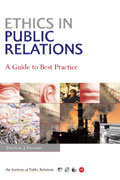About a month ago, I responded to a call for proposals for presentations/workshops/panels for the 2013 meeting of the Canadian Public Relations Society. The title of my presentation is: Did you really say that? The truth about bulls**t and PR. Here is what I submitted:

When Prof. Harry Frankfurt, a Princeton philosophy professor published his essay “On Bullshit” in 1986, he started a discussion that could only be interpreted as a serious indictment of the ‘truthfulness’ or lack thereof of our field. This presentation will “inspire participants to challenge norms and live beyond the status quo” by understanding what constitutes BS and how PR messaging can avoid contributing to it. Together we will explore the definition of BS and examine instances of BS in PR & marketing campaigns in Canada. It is only through an ethical lens that we can begin to reframe the conversation.
I opened my email this evening to discover correspondence from one of the conference organizers. Here is what it said, “Thank you for submitting a presentation abstract for the Canadian Public Relations Society’s conference Conversations 2013. Your submission has made it to the next round of review, where we will be asking for the communications community to vote on the sessions they are most interested in seeing at next year’s event. ..”
I read it again. I shook my head, and the feeling of being professionally insulted started making its way up the back of my neck. A professional organization is holding a popularity contest to determine what presentations ought to be on the conference agenda? Well, what a creative idea. Voting will begin on Friday.
Here is what I said to the conference organizers:
I can appreciate the desire to take a creative approach to planning a conference, however, I did not sign up to be part of “Canadian PR Idol.” At this point in my career I have no desire to be part of a popularity contest. My submission was genuine and submitted with integrity. I had hoped that selections would be made in kind.
Clearly transparency and its ethical underpinnings are not part of the CPRS conference mandate. If this information was on the call for proposals, I seem to have missed it. It seems that my take on PR and BS was right on the money.
I thus withdraw my submission…”
Public relations as a field has been the butt of many a joke about its methods and its ethics for a very long time. As I wrote in my 2009 book Ethics in Public Relations: A Guide to Best Practice (London: Kogan Page), “There is little doubt that, even today, public relations as an industry still suffers from a bad reputation. Consider journalism professor Stuart Ewen’s 1996 book PR! A Social History of Spin, where he describes what he calls a ‘foundational conceit’ in the field of public relations – conceit born of the notion that the public mind can and should be manipulated…” Well it seems to me that having a popularity contest to select presentations at the annual conference smacks of this conceit because I can assure you that the popular offerings will not be about ethics. What they’ll be about his year depends on the trend-du-jour. Whenever I speak at CPRS about ethics, as I have on many occasions before, the same people are always in the room. I am constantly preaching to the choir.
I thought that the professional association to which I have belonged for many years was supposed to set the highest standards of practice – I thought that the professional association was supposed to concern itself with what the members of its profession need to learn about – rather than what they want to learn about. I thought that this professional association might take seriously its responsibility to evaluate proposals and accept the best of them (whether or not mine would be counted among those is immaterial: at least the process would have been professional, and I would have been convinced that some set of quality criteria were being applied to the selections rather than the results of popular vote). I guess I thought wrong.
But make no mistake; most of the submitters will like this approach. After all, who can argue with the popularity of the competition where the public gets a say in the results regardless of any measure of objective quality?
It’s clearly time for me to retire. Time to stop talking about ethics, writing about ethics, teaching about ethics. As far as I can see, it’s pretty much a lost cause.
[Apologies to my subscribers who tune in to read about my writing – this is only peripherally connected, but I had to get it off my chest.]